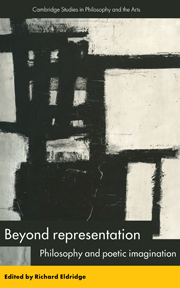Book contents
- Frontmatter
- Contents
- List of contributors
- Editor's acknowledgments
- 1 Introduction: from representation to poiesis
- 2 Confession and forgiveness: Hegel's poetics of action
- 3 The values of articulation: aesthetics after the aesthetic ideology
- 4 In their own voice: philosophical writing and actual experience
- 5 Poetry and truth-conditions
- 6 Fractal contours: chaos and system in the Romantic fragment
- 7 The mind's horizon
- 8 Kant, Hölderlin, and the experience of longing
- 9 Wordsworth and the reception of poetry
- 10 Self-consciousness, social guilt, and Romantic poetry: Coleridge's Ancient Mariner and Wordsworth's Old Pedlar
- 11 Her blood and his mirror: Mary Coleridge, Luce Irigaray, and the female self
- 12 Scene: an exchange of letters
- Index
7 - The mind's horizon
Published online by Cambridge University Press: 06 July 2010
- Frontmatter
- Contents
- List of contributors
- Editor's acknowledgments
- 1 Introduction: from representation to poiesis
- 2 Confession and forgiveness: Hegel's poetics of action
- 3 The values of articulation: aesthetics after the aesthetic ideology
- 4 In their own voice: philosophical writing and actual experience
- 5 Poetry and truth-conditions
- 6 Fractal contours: chaos and system in the Romantic fragment
- 7 The mind's horizon
- 8 Kant, Hölderlin, and the experience of longing
- 9 Wordsworth and the reception of poetry
- 10 Self-consciousness, social guilt, and Romantic poetry: Coleridge's Ancient Mariner and Wordsworth's Old Pedlar
- 11 Her blood and his mirror: Mary Coleridge, Luce Irigaray, and the female self
- 12 Scene: an exchange of letters
- Index
Summary
In Philippe Lacoue-Labarthe and Jean-Luc Nancy's brilliant study of early German Romanticism, The Literary Absolute, the authors establish that a crucial element of the matrix of influences out of which this Romanticism developed was Kant's critical philosophy. The translators of the book write, “What The Literary Absolute demonstrates is first of all that the concept of literature arises as a response to the problems posed by Kant's critical enterprise.” Lacoue-Labarthe and Nancy themselves write, “Philosophy, then, controls romanticism. In this context, and crudely translated, this means that Kant opens up the possibility of romanticism … The romantics have no predecessors. Especially not in what the eighteenth century insistently held up under the name of aesthetics. On the contrary, it is because an entirely new and unforeseeable relation between aesthetics and philosophy will be articulated in Kant that a ‘passage’ to romanticism will become possible.”
Their book traces a particular track of Romanticism as it develops in the circle associated with the journal, the Athenaeum – a track for whose importance they argue. In this chapter, I want to go back to the problematic in Kant which they identify as crucial – “the problematic of the subject unpresentable to itself” in order to clarify the issue that it presented to Hegel and to subsequent philosophers who are not a part of their sharply focused discussion of early German Romanticism. I am inclined to regard this issue involving, as it does, the relations among self, world, and representation, as, perhaps, the best around which to try to organize a view of nineteenth- and twentieth-century philosophy, but I shall not attempt any such far-reaching synthesis in this chapter.
- Type
- Chapter
- Information
- Beyond RepresentationPhilosophy and Poetic Imagination, pp. 151 - 174Publisher: Cambridge University PressPrint publication year: 1996

